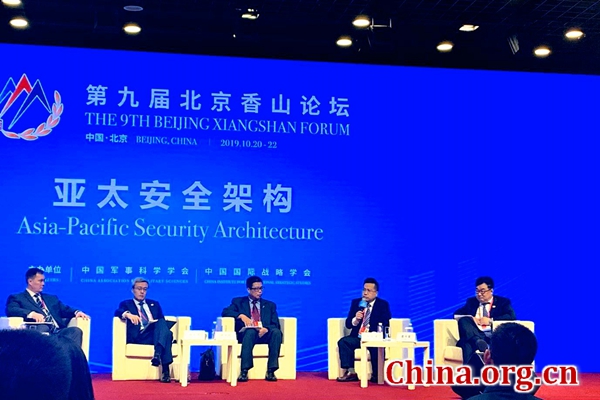Experts call for an effective Asia-Pacific security architecture
- By Cui Can
 0 Comment(s)
0 Comment(s) Print
Print E-mail China.org.cn, October 22, 2019
E-mail China.org.cn, October 22, 2019

In recent years, the Asia-Pacific region's security situation has become more complex, with countries facing increasingly complicated and pressing challenges. One of the principal causes of this is the ineffectiveness of the current security architecture. How to reshape regional security institutions to meet security challenges and prevent future crises has emerged as a critical topic both among government officials and the academic community.
At this year's Xiangshan Forum, regional military officials and experts gathered to discuss the role of an effective Asia-Pacific security architecture in maintaining world peace and stability.
Wang Jisi, president of the Institute of International and Strategic Studies of Peking University, said at the forum that since the end of the Cold War, security architecture in Asia has been based on a network of U.S. bilateral security alliances in Northeast Asia.
In contrast to this mechanism, China envisions a multi-layered, comprehensive and diversified future regional security framework in the whitepaper "China's Policies on Asia-Pacific Security Cooperation" released in January 2017.
Another emphasis of the whitepaper is on the parallel development of regional security and economic frameworks, which serve as the basis for establishing a robust security architecture. "Given the numerous economic cooperation structures in the Asia-Pacific, it is imperative to establish a regional security architecture that suits the realities in the region." Wang said.
Alexander Lukin is a director at the Center for East Asian and Shanghai Cooperation Studies, Moscow State Institute of International Relations of the Russian Foreign Ministry. He endorsed Wang's proposal and underscored the need to build an Asia-Pacific security framework based on multilateralism, to set up meetings as needed and cool any potential tensions.
Lukin prioritizes geopolitical and strategic aspects, while also considering other dimensions of the regional partnership, including the economic one. "Initiatives of multilateralism, such as the Belt and Road Initiative (BRI), Shanghai Cooperation Organization (SCO) and Eurasian Economic Union provide platforms to foster closer dialogue and practical cooperation in economic areas among the member states," he said.
While many scholars at the forum believe that a new security architecture in the Asia-Pacific region will be hard to realize within a short time, it is still necessary to push forward. The region continues to face uncertainties and challenges and the only way to preserving a long-term peace is through cooperation and dialogue.
Ruan Zongze, executive vice president of the China Institute of International Studies, pointed out that the path may be challenging but the future is bright.
"Every major country in the region should bear its own responsibility and pursue mutual trust and development to jointly address challenges and fully realize an all-win Asia-Pacific security architecture," he said.






Go to Forum >>0 Comment(s)